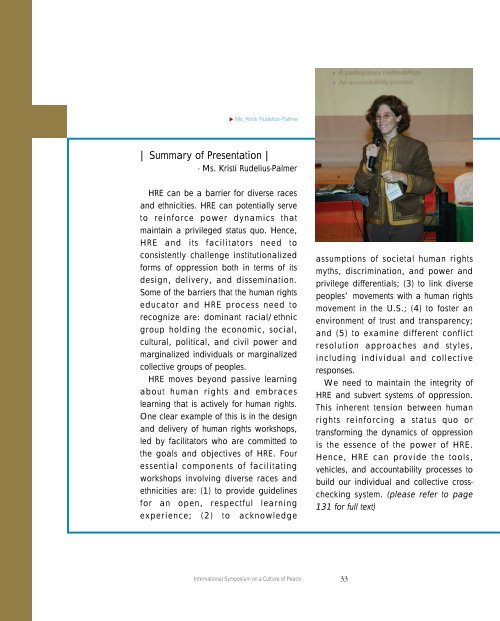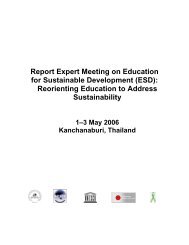Intercultural Understanding and Human Rights Education ... - APCEIU
Intercultural Understanding and Human Rights Education ... - APCEIU
Intercultural Understanding and Human Rights Education ... - APCEIU
You also want an ePaper? Increase the reach of your titles
YUMPU automatically turns print PDFs into web optimized ePapers that Google loves.
▶ Ms. Kristi Rudelius-Palmer<br />
| Summary of Presentation |<br />
- Ms. Kristi Rudelius-Palmer<br />
HRE can be a barrier for diverse races<br />
<strong>and</strong> ethnicities. HRE can potentially serve<br />
to reinforce power dynamics that<br />
maintain a privileged status quo. Hence,<br />
HRE <strong>and</strong> its facilitators need to<br />
consistently challenge institutionalized<br />
forms of oppression both in terms of its<br />
design, delivery, <strong>and</strong> dissemination.<br />
Some of the barriers that the human rights<br />
educator <strong>and</strong> HRE process need to<br />
recognize are: dominant racial/ethnic<br />
group holding the economic, social,<br />
cultural, political, <strong>and</strong> civil power <strong>and</strong><br />
marginalized individuals or marginalized<br />
collective groups of peoples.<br />
HRE moves beyond passive learning<br />
about human rights <strong>and</strong> embraces<br />
learning that is actively for human rights.<br />
One clear example of this is in the design<br />
<strong>and</strong> delivery of human rights workshops,<br />
led by facilitators who are committed to<br />
the goals <strong>and</strong> objectives of HRE. Four<br />
essential components of facilitating<br />
workshops involving diverse races <strong>and</strong><br />
ethnicities are: (1) to provide guidelines<br />
for an open, respectful learning<br />
experience; (2) to acknowledge<br />
assumptions of societal human rights<br />
myths, discrimination, <strong>and</strong> power <strong>and</strong><br />
privilege differentials; (3) to link diverse<br />
peoplesmovements with a human rights<br />
movement in the U.S.; (4) to foster an<br />
environment of trust <strong>and</strong> transparency;<br />
<strong>and</strong> (5) to examine different conflict<br />
resolution approaches <strong>and</strong> styles,<br />
including individual <strong>and</strong> collective<br />
responses.<br />
We need to maintain the integrity of<br />
HRE <strong>and</strong> subvert systems of oppression.<br />
This inherent tension between human<br />
rights reinforcing a status quo or<br />
transforming the dynamics of oppression<br />
is the essence of the power of HRE.<br />
Hence, HRE can provide the tools,<br />
vehicles, <strong>and</strong> accountability processes to<br />
build our individual <strong>and</strong> collective crosschecking<br />
system. (please refer to page<br />
131 for full text)<br />
International Symposium on a Culture of Peace 33








